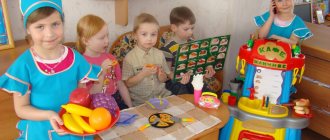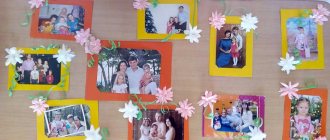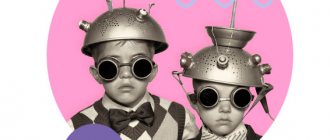Without exception, all parents must raise their children morally. This important criterion combines a complex of all the positive feelings and skills of any person. Those children who were raised in an atmosphere of morality easily go to the aid of another person, feel comfortable in a team, they persistently pursue their dream, turning it into a goal, while remaining honest. These children have self-confidence, they are brave and courageous, polite towards everyone around them without restrictions, and adequately perceive criticism.
How to educate children to be moral?
In order for children to grow up moral, parents, school teachers and other adults around them must adhere to certain rules in their upbringing. The main place is occupied by parents; without effort, the moral education of children is difficult or impossible.
The personal example of an adult family member has a good effect on children. It is useful to do good deeds in front of your child. For example, bring a bag to an old neighbor on the floor or give up a seat in public transport and ask your son or daughter to do the same.
From a young age it is necessary to place a person in conditions in which he must do what is right and good. For example, if a small child falls in the sandbox, you need to draw your child’s attention to this and unobtrusively suggest that he help the fallen child.
It is not just useful, it is even necessary to introduce your child to the life stories of people in the family who have committed a good deed or even a feat in life. You definitely need to tell your daughter or son about “the lives of wonderful people” and literary heroes. In a normal family, children should enjoy doing moral things.
Quarrels and even fights often occur between children because they cannot divide things. This happens because of adults who do not allow their children to share, this cannot be done, on the contrary, you need to praise the child for being able to share and lending his things to his friends for a while and explain that by sharing he is acting like a moral person . When treating your child with sweets and other tasty treats, you need to explain to him that it will be very good if the baby shares it with someone.
Father and mother should note for themselves that the family should always be the most reliable place for children, where they feel safe.
It will be good if children from a young age know that they must always and everywhere tell the truth, and that lying is not a moral act. Children need to know that telling the truth to their family and getting punished is better than hiding it.
Children should understand that when helping someone, they should not expect praise or reward. Knowing that they have done a good deed is the reward.
Every child should be taught to help elders, since moral education includes training in work. By doing homework, the child realizes that he is significant in his family, and it becomes pleasant to do good deeds.
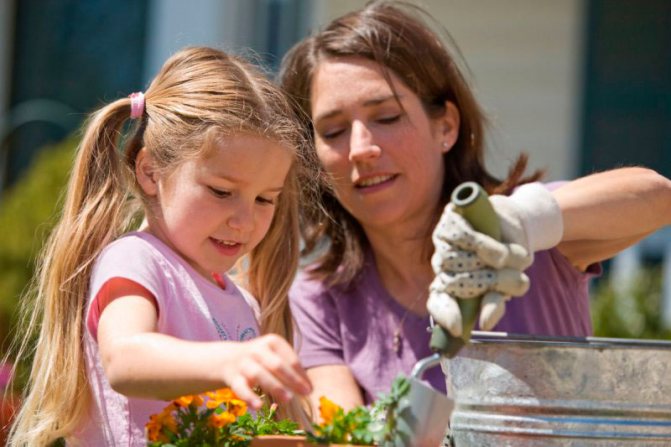
The role of the family in nurturing the moral qualities of a teenager
The upbringing of the younger generation is the most important factor in the development of society. Its function is to transmit from generation to generation the multifaceted experience of people, expressed in general culture, science, art, language, morality, behavior, and social relations. The formation of personality in childhood, adolescence and adolescence, which occurs at school and in the family, are the main stages of preparing a person for society through education.
Moral education plays an important role in the overall system of comprehensive personal development. The moral development of personality is a complex and contradictory process. This includes the assimilation of historically established concepts in the field of morality of modern society, and the achievement of a high level of self-control.
The moral education of a child begins early, from preschool age, when children’s first behavioral habits are formed. The development of moral qualities must be given serious attention.
Children receive systematic moral education at school. Here they master the basics of science, learn about the world, develop their minds and feelings, and become involved in the life of the community. But these are only the most general stages of personality formation.
One of the most important factors in the formation of personality is the family. It is the family that gives the child his first life experience, lays the foundations of character and moral character, and his manners. What is instilled in a person in childhood, one way or another, affects him throughout his life.
The family creates the personality of the child, then the teenager, the young man with its lifestyle, directs the development of children by the nature of the relationship between spouses, between the older and younger generations, as well as various pedagogical means used to achieve certain educational goals.
The problem of raising children in a family is one of the complex and multifaceted. Education prepares a person for life and work, transmits to him production and labor experience and spiritual wealth accumulated by humanity. Moral education shapes the views and beliefs of the younger generation, strengthens the will and character of a person, etc.
The foundations of morality are laid, first of all, in the family. It is in the family that children acquire their first knowledge and concepts about life, people, and their relationships with each other. In the family, from the first years of their lives, children become acquainted with social moral values, receive information about events occurring in the world around them, and learn their assessment from the mouths of their parents and elders.
A significant role in children acquiring the best human qualities is played by the personal example of parents, their work, knowledge, and moral character. Everything that a child sees and feels in his early years leaves a deep, indelible mark on his mind.
To be morally educated means to respect everyone who works, to work well yourself, to be active in everything, to have a creative approach to work, to try to bring as much benefit as possible, to be honest, fair, impatient with cruelty, evil, and all forms of humiliation of a person.
The foundation of morality is laid in humanity, in kindness. When cultivating kindness, you should know that a person who has experienced the kind attitude of others himself becomes better, more responsive to the misfortune of others.
Proper upbringing of children in the family can be helped by the means available to each family for forming the moral consciousness of children: telling fairy tales, reading aloud to children, conversations, games, suggestions, etc., as well as the personal example of parents, labor and aesthetic education in the family, communication with nature. For example, fairy tales have enormous power to influence the feelings and imagination of children, their psyche. They contain wonderful fictions, deep morals, and the accumulated wisdom of many generations over centuries. Listening to fairy tales, the child is mentally transported to the times of long-past events, gets acquainted with the life and customs of different tribes and peoples. What the people have experienced becomes close to him - grief and joy.
The educational power of parental example is extremely great. Children in their behavior copy their parents in everything, right down to verbal expressions and gestures. It has long been noted that in families where adults work conscientiously, are friendly to people, are truthful, honest, etc., the moral development of children occurs without any deviations, as well as without much effort on the part of parents. And vice versa.
The example of parents is the first model to which the child is guided and on the basis of which he masters various forms of human relationships. This is very important, since first impressions are the strongest and last a lifetime. Children are constantly focused on their parents and communicate with them on a daily basis. Therefore, they learn the way adults act, their manners, habits, as well as internal qualities, way of thinking, attitude towards their responsibilities, etc.
This communication is unique, because... built on a feeling of love and affection for parents, sanctified by their authority. This strengthens the influence of parents on all aspects of the personality: appearance, views, interests, attitudes towards work, towards others, etc.
The family serves as the most important nutritious source of a child’s moral development.
The perception and assimilation of the way of thinking, as well as the actions of parents, the nature of their behavior is carried out at the level of imitation. “Imitation,” points out A.G. Kovalev, “is the most characteristic way for a child to understand reality, and imitation is the main property of a developing personality.”
Parents need to be well aware of the school's student conduct rules and help ensure that their child learns to comply with all the requirements of these rules. Advice on how to implement these tasks can be obtained at school, from the class teacher. A.S. Makarenko noted that the true essence of educational work... is not at all in your conversations with the child, not in direct influence on the child, but in the organization of your family, your personal and social life and in the organization of the child’s life. Taking into account national characteristics and family structure, factors influencing the upbringing of children in the family and preparation for independent life are.
1. The main source of this influence is the social unity of the family with the life of the people, with the goals of society, and the parents’ high demands on themselves, their work, and their behavior. The need to share with children your successes in work and social life, and at the same time show great interest in the successes of children in learning to work.
- Joint work in the family of parents and children, reasonable division of labor between all family members.
- Organization of the entire everyday life of the family: order and accuracy in the family household; -planned distribution of the family budget; the order of storing things (which things should be put in their place); - general daily routine (time of sleep, work, rest); determination for each workplace, a place for classes; compliance with family rules (if you buy it, bring the change when leaving home, tell or leave a note when you return); From early childhood, assign children permanent responsibilities (self-care, feasible work, etc.)
- Creating favorable relationships in the family: participation in the lives of family members, mutual understanding, friendship and respect between elders and younger ones. Children grow up quickly, parents need to take into account their growing needs, recognize their right to independence, and respect them as individuals.
- Another important factor influencing the upbringing of children in the family is the progressive traditions of the Tajik people. For thousands of years, in the process of work, everyday life and family life, traditions, customs, and rituals were created, the observance of which ensured the functioning of society. The educational efforts of the people were aimed at the fullest possible transfer of thoughts, feelings, and habits to the younger generation; youth, through family life, traditions, customs and rituals, adopted the experience of older generations, which was consolidated in consciousness, spiritual culture, and way of life.
Having gone through a long historical development, many Tajik folk traditions have reached our days, which can have a positive influence and educational impact on the moral education of the younger generation and preparing them for a future independent life.
Scientific interest in this problem is caused, firstly, by the fact that the future belongs to the future development of a democratic society in our republic and market, social relations of young people; secondly, the foundations for comprehensive harmonious development, consolidation, preservation and multiplication of moral and spiritual values are laid in the family; thirdly, in the real process of life there are not only positive, but also negative, conservative factors that influence the upbringing of the younger generation. Overcoming and eliminating them is also one of the important social and pedagogical tasks; fourthly, the connection between the school and the parents of students is a means of identifying shortcomings in the upbringing of children in the family and educating parents on pedagogical methods of education. fifthly, the educational process at school allows for the comprehensive education of students and assists parents in improving their pedagogical knowledge.
The school occupies a leading place in the education of the younger generation, since it is the coordinator of the upbringing of children in the family and school and corrects the unsatisfactory upbringing of children by parents in the family, i.e. in the process of educational work at school, corrects shortcomings in family education. This is possible only if the joint educational work of the school family is established, uniform pedagogical requirements for the education of younger schoolchildren and familiarization with children and their parents before entering primary school. This is the pedagogy of cooperation or pedagogical interaction between family and school in educational work.
Moral education is the most important aspect of the formation and development of a child’s personality and involves the formation of his relationships with parents, others, the team, work, his responsibilities and himself. Junior school age is the stage of child development that corresponds to primary school education.
Therefore, a huge responsibility falls on the primary classes. In this important responsible work, an important place is given to the interaction between school and family.
Disclosure of the spiritual and moral potential of the individual, its comprehensive and harmonious development is the highest goal of society. Moral culture is one of the essential aspects of a comprehensively developed personality. Therefore, moral education has an important place in the multifaceted work of human formation. Today, its content and implementation methods should be aimed at the formation of spiritual and moral values, emotional responsiveness and responsible attitude of children to modern life and people, introducing the child to the great spiritual experience of humanity through the formation of moral consciousness at the necessary ideological level.
The importance of moral education is determined by its ability to influence the overall development of the individual. Under the influence of moral influences, a transformation of moral character occurs, a person’s views and beliefs change, his attitude towards work and people changes, and creative powers and abilities develop.
The formation of the moral culture of the younger generation is carried out in practice by the system of educational institutions and public organizations. Its center is the school. Along with school, the family plays an important role in this, as the child’s immediate social environment. The family has its own specific potential for diverse moral influences on the student’s personality and is one of the leading links in the system of moral education.
Information about the family is necessary for the teacher to solve pedagogical problems: to understand the origins and causes of the scenario of student personality development, including deviant development; to develop individual tactics for interaction with parents.
The relevance of the problem of relationships between adolescents and parents lies in the fact that most family conflicts are associated with the inability or unwillingness to understand each other: parents - children, children - parents. In order to identify the relationship between adolescents and their parents, a teacher-psychologist conducted a survey with first-year students. Tasks: to determine relationships in the family, identify family conflicts and outline ways to eliminate them, process the data and bring them to the attention of parents, industrial training masters, class teachers, and make recommendations.
Contingent: During the survey there were 77 respondents. 80% of 1st year students were covered. From the survey, the following results were obtained: 74 people consider family relationships to be good, 2 people. bad, 1 person very bad. 69 respondents consider their family to be a friendly family group, 7 people are not very friendly, and 1 person is not friendly at all. Family traditions that help strengthen the family include birthdays, New Years, travel, fishing, trips to the sea, parents' wedding anniversary, and the tradition of decorating the Christmas tree.
To the question: “What does your family do when they get together?” 22 people answered that they solve life’s problems together, and are engaged in family and household work. 8 students, 2 people. working on a personal plot, watching TV shows together 10 people, 26 people. discuss issues of studying in college, share their impressions of their day, their successes and failures, and 9 people. They replied that they were each doing their own thing.
To the question “Are there quarrels and conflicts in your family?” — 6 people answered yes often, sometimes - 14 people, rarely - 25 people, there are no quarrels - 32 people. What causes quarrels and conflicts? The answers were as follows: misunderstanding by family members of each other - 51 people; violation of the ethics of relationships (rudeness, infidelity, disrespect) - 7 people; refusal to participate in family affairs and concerns - 6 people; disagreements in matters of raising children – 8 people; alcohol abuse -1 person. 51 respondents, out of those surveyed, resolve conflicts in the family through reconciliation, discuss the situation and make a mutual decision - 18 people, turn to other people for help - 4 people, conflicts in the family are not resolved and are protracted - 4 people. Reaction to family conflicts among respondents: 8 people worry and cry; take the side of one of the parents - 2 people; trying to reconcile –56 people; leaving home -1; withdraw into themselves - 5; are indifferent – 3 people; become embittered, uncontrollable - 2; trying to find support in other people - 0.
The data obtained during the survey allowed us to formulate a set of methodological recommendations and proposals for developing adolescents’ ideas about the family as a basic value of society, fostering a sense of love and pride for their family, and respect for their parents.
Original publication (Read the work in full): The role of the family in nurturing the moral qualities of a teenager
Mistakes that interfere with the development of morality
- When trying to raise a moral recipient, there is no need to force him to do something, saying that this is a moral matter. Children must be led in the family to the point that they themselves really want to always act honestly and justly; this is what moral education means.
- You cannot tell your children that good deeds should be done only for the family, and that you can act differently with other people.
- People who make mistakes are those who do not allow their children to let other children play with their things or give a treat to a family member or someone else.
- It is a mistake to pay money or gifts for excellent studies or good deeds.
Family as the basis
The importance of the family is also so great because the child receives his first experience in it, which he strives to realize in later life. The behavior of the father and mother is the first role model for the child. The child unconsciously begins to adopt intonation, manner of speaking, sentence structure, gait, and even speech defects. The baby also begins to carefully observe how the parents’ relationships develop with other people and the environment. Caring for loved ones, respecting other people's interests, the ability to control one's feelings and behavior - everything comes from the family.
What it is
How to choose the right position of moral education?
To do this, adults must know the definition of the concepts of morality, morality, and education .
Education refers to the assimilation of certain skills of social behavior instilled in the surrounding social environment, parents, and teachers.
A person uses these skills in social life. For example, he learns the rules of behavior at school, on vacation, etc.
Morality is the moral qualities of an individual , which set the boundaries of behavior, his spiritual qualities necessary for adaptation to the social environment.
That is, moral principles are the boundary that a person will never cross. Without these principles, humanity becomes like animals, guided only by instincts.
An individual may be well-mannered, know all the rules of etiquette, but his actions will be immoral, immoral.
Mom and her role in moral education
A mother is obliged to raise her child. An important moral achievement for a child is to learn to understand the words “you can’t” and “you can.” These should be the first steps towards mastering the world and other people. If a child does not learn such rules, he will treat others unrealistically, as if the only interests in the world are his and himself.
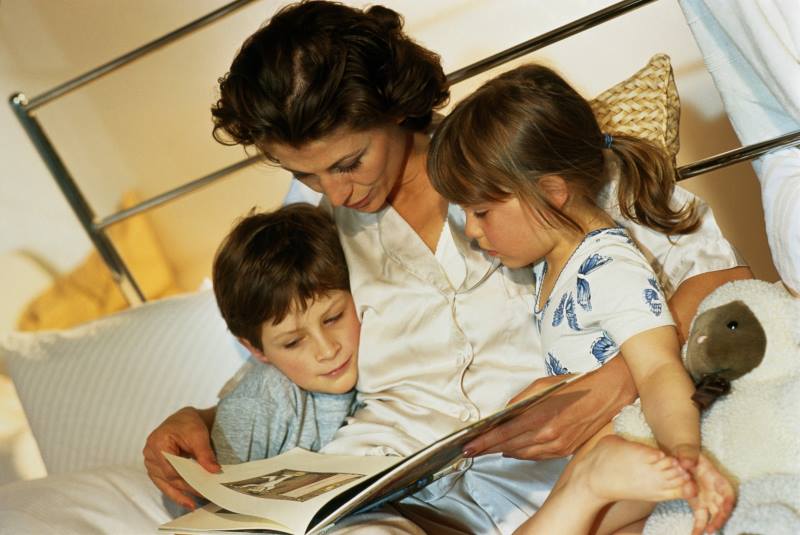
“You can” and “you can’t” are better learned from the lips of a mother who has close emotional contact with her child, through which moral ideas are transmitted most quickly. The mother is obliged to monitor the baby’s behavior at this age using the assessment method. There are some parents who oppose assessment and do not seek to give it, but in fact, the child interprets its absence in his own way, and often in a positive way. Silence usually means “maybe.” Of course, it is not worthwhile to traumatize a child with constant moral convictions. They must be resorted to in cases where it is impossible to do without them - in the event of a serious offense.
The mechanism of moral development of personality
The strength and stability of a moral quality depend on how it was formed, what mechanism was used as the basis for pedagogical influence. Let us consider the mechanism of moral development of personality. For the formation of any moral quality, it is important that it takes place consciously. Therefore, knowledge is needed on the basis of which the child will form ideas about the essence of moral quality , its necessity and the advantages of mastering it. The child must have a desire to master a moral quality , that is, it is important that motives arise for acquiring the corresponding moral quality . The emergence of a motive entails an attitude towards quality, which, in turn, shapes social feelings. Feelings give the formation process a personally significant coloring and therefore influence the strength of the emerging quality. But knowledge and feelings generate the need for their practical implementation - in actions and behavior. Actions and behavior take on the function of feedback, allowing you to check and confirm the strength of the quality being formed.
Thus, the mechanism of moral education : (knowledge and ideas) + (motives) + (feelings and attitudes) + (skills and habits) + + (actions and behavior) = moral quality . This mechanism is objective in nature. It always manifests itself during the formation of any ( moral or immoral ) personality trait.
The main feature of the mechanism of moral education is the absence of the principle of interchangeability. This means that each component of the mechanism is important and can neither be excluded nor replaced by another. What, for example, will happen if we decide to form kindness as a moral quality of an individual and begin to instill in a child only ideas about what kindness is? Or will we not evoke a positive attitude towards this quality and the desire to master it, to become kind? Or will we not create conditions for the manifestation of kindness? Assignment: Try to explain what will happen to moral quality if one of the components is excluded. Is it possible to replace it with another component? At the same time, the action of the mechanism is flexible: the sequence of components can change depending on the characteristics of the quality (its complexity, etc.) and the age of the object of education . It is clear that it is impossible to rely on understanding and awareness of the importance of developing one or another personality quality in a child of primary preschool age . But does this mean that the time has not yet come to educate him morally ? Of course not. We need to change the sequence and start not with imparting knowledge, but with the formation of an emotional base and behavioral practice. This will serve as a favorable basis for subsequent knowledge acquisition.
The first group of tasks of moral education includes the tasks of forming its mechanism: ideas, moral feelings , moral habits and norms , and behavioral practices. Each component has its own formation characteristics, but it must be remembered that this is a single mechanism and therefore, when forming one component, an influence on other components is necessarily expected.
Education is historical in nature, and its content changes depending on a number of circumstances and conditions: the demands of society, economic factors, the level of development of science, and the age capabilities of those being educated .
Consequently, at each stage of its development, society solves different problems of educating the younger generation, that is, it has different moral ideals of a person . , the education of collectivism became the most significant , in others - patriotism. Today, business qualities, entrepreneurship, etc. have become significant. And each time the ideal created by society has been extrapolated to preschool childhood , since the phrase “Everything begins with childhood” is not only journalistic and journalistic, it also has a deep scientific meaning and justification.
Children's preschool group
A children's group is the second model of society after the family, in which a child learns to interact with other children and adults. Here moral rules are tested and sharpened. A child finds himself in a large number of situations and initially needs the constant presence of an adult.
No moral arguments will help if the baby is not supported, comforted and heard. Children need to be given the opportunity to complain and cry, and only after that make a moral analysis of their behavior.
Raising kids
It is impossible to overestimate the role of the family in moral education. You need to work with children in this regard from an early age; this is the only way to receive the fruits of your upbringing. Moral questions and dilemmas begin to appear in children as soon as they begin their first contact with people. A child, playing with his peers, experiences many new feelings, one of which is healthy aggression.
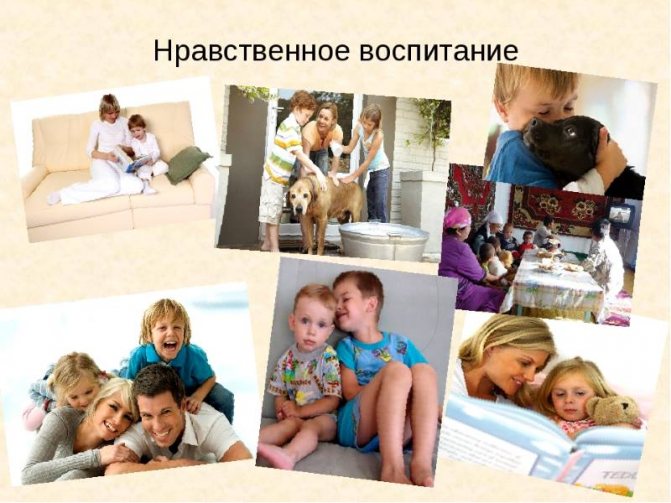
The kid competes, defends his rights and things, and in quarrels he acts sensibly to a certain point, until he begins to develop habits and behavior patterns that make him limited in contacts. For example, in order not to share with others, he plays alone or fights so often that no one takes him into games. Moral education should help the child develop certain manners of behavior that will help him socialize and adapt in society, and not interfere with others. The adult plays the most important role. At a younger age, talking with kids will not help; only the power of the example that parents show in communicating with each other and the child works.
Children can learn up to a certain age, only in games they will try out their new behavior as if in make-believe. Despite the fact that the game is not a serious activity, the feelings that are experienced in them are strong and real. In games where the conditions require sharing, behaving with restraint, attentiveness and accuracy, the child will be able to hone his behavioral skills and lay the foundation for his moral education.
Means and methods of moral education
Moral education is carried out using certain means and methods .
Means of moral education of preschool children can be combined into several groups.
Fiction, visual arts, music, cinema, filmstrips and other media can be combined into a group of artistic media. This group of means is very important in solving problems of moral education , as it contributes to the emotional coloring of cognizable moral phenomena. Numerous studies (N. S. Karpinskaya, L. N. Strelkova, A. M. Vinogradova) show that children vividly, emotionally and trustingly perceive fairy tales, poems, stories read to them , and look at illustrations for books (V. A. Eliseeva, G. N. Panteleev). A child is strongly impressed by the work of artists if they depict the world realistically and understandably for a preschooler . Artistic means are most effective in forming moral ideas and cultivating feelings children .
The means of moral education of preschool children is nature . Nature makes it possible to evoke humane feelings in children , a desire to take care of those who are weaker, who need help, to protect them, and helps to build self-confidence in the child. The impact of nature on the moral sphere of children’s personality is multifaceted and, with appropriate pedagogical organization, becomes a significant means of educating feelings and behavior (S. N. Nikolaeva, L. G. Niskanen, V. G. Fokina, V. D. Sych).
The means of moral education of preschoolers children’s own activities : play, work, learning, artistic activity. Each type of activity has its own specifics, performing the function of a means of education , but this means - activity as such - is necessary, first of all, when developing the practice of moral behavior . A special place in this group of means is given to communication, if, following the psychologists (M. I. Lisina, A. G. Ruzskaya), it is considered a type of activity. Communication as a means of moral education best fulfills the task of adjusting ideas about morality and cultivating feelings and relationships .
The means of moral education can be the entire atmosphere in which the child lives: the atmosphere can be imbued with goodwill, love, humanity or cruelty, immorality . The environment surrounding the child becomes a means of educating feelings , ideas, behavior, i.e. it activates the entire mechanism of moral education and influences the formation of certain moral qualities .
The choice of means of education depends on the leading task, on the age of the students , on the level of their general and intellectual development, on the stage of development of moral qualities (we are just beginning to form a quality, or are consolidating it, or are already re-educating ). As you know, the remedy becomes effective in combination with adequate methods and techniques of education .
In pedagogy, there are several approaches to the classification of educational methods (Yu. K. Babansky, B. T. Likhachev, I. P. Podlasy - in general and school pedagogy; V. G. Nechaeva, V. I. Loginova - in preschool pedagogy ) . To classify methods, researchers determine one basis. Thus, Academician B. T. Likhachev proceeds from the logic of the integrity of the pedagogical process, as well as the logic of its organization when solving problems of moral education and self-education .
According to this basis, he distinguishes three groups of methods : methods of organization and self-organization of the educational team (collective perspective, collective game, competition, common requirements); methods of trusting interaction ( method of respect , pedagogical requirement, persuasion, discussion, conflict situations); methods of influence (clarification, stress relief, dream actualization, appeal to consciousness, feeling, will and action). V. G. Nechaeva distinguishes two groups of methods of moral education of preschool children : organization of practical experience of social behavior ( training method , demonstration of action, example of adults or other children , method of organizing activities); moral ideas in (conversations, reading works of art, viewing and discussing paintings and illustrations).
the method of persuasion , positive example, encouragement and punishment in both the first and second groups The classification proposed by V. I. Loginova is built on the same basis as that of V. G. Nechaeva - on activating the mechanism of moral education - but it is more complete. The author proposes to combine all methods into three groups .



